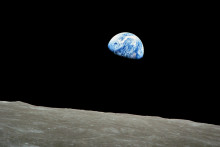Asteroid mining and the settling of communities on Mars are becoming a latent possibility as time and resources are increasingly put towards space colonization. We asked two Master students to share their opinions on what is driving these technological and political efforts, and what may be the implications of an interplanetary civilization.
Alice Fox, a Philosophy of Science, Technology and Society student, recently contributed in a joint research on Interstellar Colonization. Filippo Bianchi is studying Mechanical Engineering and his current research is focused on launch vehicle structures.
What are your personal projections for space colonization? Is it feasible within the next 50 to 100 years?
Bianchi: ‘I think it will absolutely happen within our lifetime. Many companies are already involved and working towards this or similar projects like that company who wants to put a hotel in LEO by 2021 for tourists. There’s a lot of will to go out there, and while some companies make too wild claims and projections, I do believe we will set foot on Mars within 25 years.’
Fox: ‘I am pretty skeptical. There’s a big difference between tourism and colonization. With colonization, you need a certain infrastructure and there’re also many more dangers involved. Radiation on Mars is quite high, there will be issues with food growth and population growth, and there are many other constraints. So, we might be getting too far ahead of ourselves. Smaller base establishments, like a lunar base, might be possible within that 25-year projection, but not colonization.’
What do you think is the drive behind space colonization? Who or what is pushing it?
Bianchi: ‘For many, the end goal is to save the human species due to the various threats to our existence. My personal drive is just wondering what’s out there. To try and understand why we are here, to solve those fundamental questions. It’s not just a push of technology, such as better tools and structures, but also a push to resolve philosophical and ethical questions. Are we the only ones in the universe or not? I’m passionate to know what’s out there.’
Fox: ‘I would like to add on the reasons for colonization though. For example, issues like overpopulation on Earth. There’s also an economic drive, such as people selling parts of the moon. That’s a more capitalist perspective, but not everything is going to be colonized by the people for the people. It will be initiated and catalysed by private companies, who stand to make a profit.’
But is privatizing space colonization the best idea? Or can there be alternative models for colonization?
Bianchi: ‘I think space is for everyone and we should all benefit from it. If there’s a company who wants to invest in asteroid mining, that’s a good thing and it must become human heritage. The Outer Space Treaty is very political, but it should involve everyone. There must be a collective agreement of who owns what part of space.’
Fox: ‘That agreement would be really difficult to achieve, though. Think about the differences in values we have here on Earth: Eastern versus Western values, Europe versus the United States, et cetera. There’s a huge difference between countries of what people think is important. If there are already so many differences and inequalities here on Earth, why would space colonization make those inequalities go away instead of magnifying them? It’s probably going to come down to who colonizes something first.’
Bianchi: ‘I am more positive about it. Of course, I wouldn’t want space colonization to be like during the Cold War, as a race between countries. It should be something that brings us together, that unifies us as human beings. If we can take the resources from space, we should share it with everyone.’
Fox: ‘I agree. But when you say “we”, who do you mean? Even resources that should already be shared on Earth are not being treated that way. The U.S. produces enough food for the rest of the world, yet most of it gets thrown away. So why would this be different when people go to space and bring back valuable resources?’

In regard to the issues here on Earth, do you think space colonization might be obscuring them? Should we aim at fixing those first?
Fox: ‘There’s an escapism mentality, a “we’re just going to leave Earth” mentality that I think is pretty dangerous. Don’t get me wrong, I’m all up for having backup plans, but people are stuck in a false dilemma. They think we can either focus on Mars or on Earth. So I say: why not both?’
Bianchi: ‘I agree, space colonization can reduce unemployment, lead to new jobs, and we can use the newly discovered technologies and knowledge to solve issues here on Earth.’
So instead of focusing on small incremental changes to fix the problems on Earth, should we push big policy changes to catalyse space colonization?
Bianchi: ‘Earth is our home and we should keep it as such. Let’s fix what’s here because we need a good basis. Do things gradually. Big dreams, yes, but taking small steps.’
Fox: ‘I think we can do both at the same time. You can take small steps to fix problems here, while also taking a leap of faith to invest heavily into space colonization, hoping that it will lead to new technology that can address those problems. We’re running out of time, so it needs to be both.’







